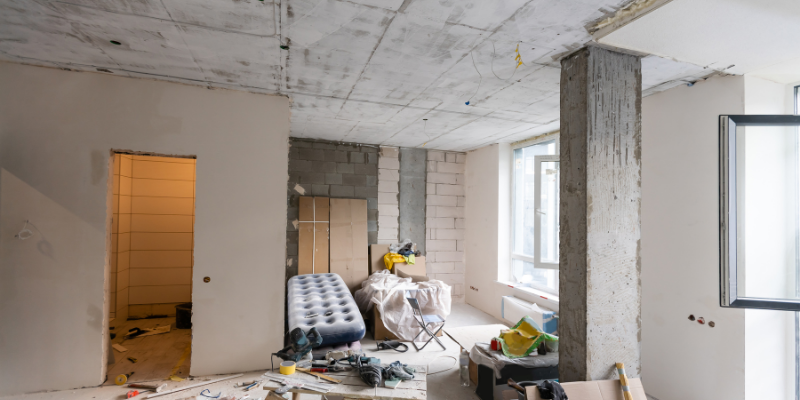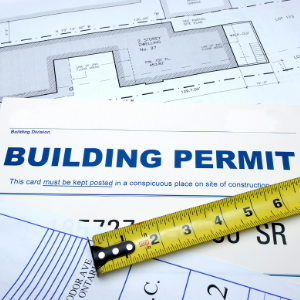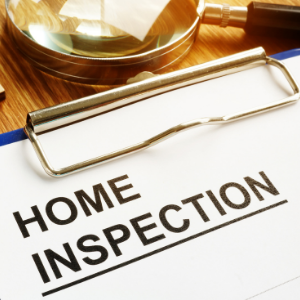
Understanding Local Building Codes and Permits in Gainesville, FL
Understanding local building laws and permits in Gainesville, FL, is critical when selling a home with unpermitted improvements. Gainesville’s building codes are intended to protect residential properties’ safety, structural integrity, and compliance.
When dealing with unpermitted work, you must be aware of the unique rules of the Gainesville Building Department. These regulations define permissible versus unpermitted work and detail the methods required to get retroactive permissions if necessary.
Sellers should be aware that unpermitted work may result in fines, delays in property sales, or even legal liabilities. Working with a local real estate agent or consultant familiar with Gainesville’s permitting procedure can provide helpful insights and advice on dealing with any unpermitted adjustments.
Sellers can make deals run more smoothly and minimize issues during inspections or appraisals by ensuring that renovations comply with local codes and correcting inconsistencies through proper permitting processes.
Common Unpermitted Work Found in Gainesville Houses

When selling a home in Gainesville, Florida, homeowners frequently uncover unpermitted work. Unpermitted room extensions are a typical problem in which extra rooms or extended living spaces are built without the proper permits.
It can be difficult to sell since it may not comply with local building codes. Homeowners may also discover that electrical work, such as additional wiring for lighting or outlets, was completed without permits, raising safety concerns that must be inspected or corrected by a professional electrician.
Plumbing alterations are another common sort of unpermitted work; this could involve adding bathrooms or making kitchen changes that the city’s building department has not allowed. Unpermitted garage conversions, when garages are converted into living spaces without obtaining the necessary permissions and inspections, are also common in Gainesville homes.
These changes might impact property taxes and insurance, so sellers must address these concerns before advertising their homes for sale.
How to Find Unpermitted Construction on Your Gainesville Property
Identifying unpermitted buildings on your Gainesville property is critical while preparing to sell your home. Examine any documentation about past restorations or expansions, as this may disclose whether legal permissions were acquired.
In Gainesville, building permits are generally necessary for substantial structure improvements, electrical work, plumbing adjustments, and other major repairs. Check the Alachua County Property Appraiser’s website or contact the local building department to see if your property’s improvements are in accordance with recorded permits.
Compare these data to your home’s current status to identify any discrepancies that could suggest unlawful work. Unpermitted buildings can be identified by mismatched materials, inconsistent design details, or spaces that do not show on official floor plans.
Also, consult a professional house inspector who is familiar with Gainesville’s building laws and may see potential red flags in construction quality or conformance to local regulations. Addressing these concerns early can help streamline the selling process and avoid hassles during negotiations with potential purchasers in the Gainesville real estate market.
But if the process feels overwhelming, Yellow Card Properties can simplify things. Instead of spending months correcting code violations, you can sell your Gainesville house fast for cash and let them handle the permitting challenges after closing.
The Role of Home Inspections in Detecting Unpermitted Work in Gainesville
Home inspections in Gainesville, Florida, are critical in finding unpermitted work when selling a home. A comprehensive examination can discover renovations or additions that do not have the required permissions, which is essential for sellers and buyers to understand the potential legal and financial consequences.
Home inspectors carefully examine structural changes, electrical systems, plumbing installations, and other improvements that may not conform to local building code requirements. By identifying unpermitted work, these inspections assist sellers in addressing issues before advertising their property for sale and give buyers vital information about any dangers involved with the transaction.
Engaging a skilled home inspector knowledgeable about Gainesville rules ensures a thorough examination of the property’s compliance status. This phase is critical for promoting transparent transactions and protecting all parties engaged in the real estate process from future liability related to improper building activity.
Legal Implications of Unauthorized Renovations in Gainesville Real Estate
When selling a home in Gainesville, Florida, with unpermitted work, it is critical to understand the legal ramifications. Unpermitted modifications might cause substantial issues during the real estate sale process.
Gainesville’s municipal building laws require permits for most remodeling work to maintain safety and regulatory compliance. If your home has unpermitted work, it may not fulfill these criteria, affecting its marketability and sale price.
Disclosure regulations in Florida require sellers to advise potential buyers of any known difficulties with the property, including unpermitted work. Failure to disclose might result in legal problems or possibly buyer litigation following the transaction.
Furthermore, lenders may be hesitant to finance properties with unpermitted modifications due to potential safety concerns and insurance issues. Before selling the property, sellers should consult with a real estate attorney familiar with Gainesville’s regulations to discuss possibilities such as retroactive permitting or negotiating conditions that resolve these concerns.
The Effect of Unpermitted Work on Property Value in Gainesville, Florida
Unpermitted work can substantially impact the value of a home in Gainesville, Florida. When homeowners make modifications or additions without the relevant permissions, they risk depreciating their property.
Potential purchasers frequently regard unpermitted work as a red flag, raising worries about safety, quality, and adherence to local building rules. In Gainesville’s competitive real estate market, homes with unpermitted modifications may receive lower bids or spend more time on the market.
Furthermore, due to potential liabilities, mortgage lenders and insurance firms may hesitate to finance or insure properties with unapproved renovations. As a result, Gainesville sellers must remedy these issues before offering their home to avoid negative impacts on appraisals and general marketability.
Understanding how local restrictions affect property assessments is critical for anyone looking to sell a home in a region with unpermitted activity.
This is why many Gainesville homeowners sell their houses for cash in Newberry to trusted local buyers like Yellow Card Properties. You skip the delays, avoid appraisal issues, and leave with a quick, guaranteed offer.
Steps to Address Unpermitted Work Before Listing Your Gainesville Home

Before you post your Gainesville house for sale, you must fix any unpermitted work to guarantee a smooth selling process. Begin by talking with a licensed contractor or inspector to determine the scope of the unpermitted modifications.
This evaluation will help you understand the required permits and whether the work complies with current building codes. Next, call the Gainesville Building Department to apply for retroactive permits. These permits may require presenting detailed drawings or conducting inspections to ensure that all construction meets safety standards.
Prepare for any alterations or improvements that may be required to bring your home up to code. You should also consider contacting a real estate attorney in Gainesville who knows local regulations and can walk you through the legal process of correcting unpermitted work.
Taking these procedures helps to get relevant documentation and fosters trust with potential purchasers by exhibiting transparency and assuring compliance with local regulations.
How to Get Retroactive Permits for Past Renovations in Gainesville Homes
Obtaining retroactive permits for previous improvements in Gainesville homes requires several essential measures to ensure compliance with local building standards. First, homeowners should call the Gainesville Building Department to explain the unpermitted activity and obtain the required application paperwork.
It is critical to provide full documentation of the completed work, including blueprints or drawings depicting the renovations. Hiring a licensed contractor who is aware of Gainesville rules can help ensure that the work satisfies current code standards.
A city official will likely assess the alterations to ensure safety and compliance. If any faults are discovered during this inspection, more changes may be required before permits are issued. Addressing these problems as soon as possible might assist in speeding up the process and avoiding potential fines or legal complications associated with selling a home with unpermitted renovations in Gainesville, Florida.
Financial Considerations: Cost vs. Benefit of Correcting Unpermitted Work Before Sale
When selling a house in Gainesville, FL, with unpermitted improvements, homeowners must evaluate the financial implications of repairing the work before marketing it. Correcting these faults can be a significant expense, as it frequently requires acquiring retroactive permissions and bringing the work up to current building requirements.
However, addressing these concerns may improve the property’s marketability and sales price. On the other hand, keeping unpermitted work as-is may cause problems during buyer inspections or negotiations, since potential buyers may want price reductions or credits for future remediation expenditures.
Furthermore, some lenders may refuse to finance houses with outstanding permitting concerns, reducing your field of potential buyers. As a result, sellers must carefully consider whether the cost of repairing unpermitted improvements will provide a better return on investment than selling the house “as-is” and maybe accepting a lower offer.
Strategies for Disclosing Unpermitted Work to Potential Buyers in Gainesville
Transparency is essential for retaining trust with potential buyers when selling a Gainesville home with unpermitted repairs. Begin by obtaining any pertinent documents for the unpermitted work, such as receipts, blueprints, and any correspondence with contractors.
This will allow you to provide a complete history of the renovations made to your Gainesville property. Speaking with a local real estate agent who knows the Gainesville market and can advise you on revealing this information without scaring away potential buyers is ideal.
During showings or open houses, be honest about any unpermitted alterations while stressing parts of the home that meet local codes and regulations. Consider obtaining an inspection report before marketing the property; this will offer potential purchasers an unbiased assessment of the home’s condition.
Offering options such as negotiating repair credits or reducing the asking price will help buyers interested in purchasing your Gainesville property overcome their reservations about unpermitted construction.
Negotiating with Buyers: Handling Offers on Homes with Unauthorized Work in Gainesville
When negotiating offers on a Gainesville property with unpermitted construction, it is critical to approach potential buyers with openness and flexibility. Buyers must be fully informed about the nature and scope of the unpermitted renovations before making an offer.
Sellers can increase buyer trust and lessen suspicion by providing detailed documentation and applicable permits for other areas of the property. Pricing the home competitively is necessary to account for the cost and inconvenience of legalizing or removing unpermitted work, which can be a central bargaining point.
Sellers should also be willing to consider other options, such as providing credits or agreeing to make necessary changes before closing. In Gainesville’s real estate market, where local restrictions and construction standards apply, having an experienced real estate agent who understands these nuances can significantly aid in successful talks with purchasers concerned about unpermitted renovations.
Expert Advice from Real Estate Agents on Selling Homes with Permit Issues in Gainesville, FL
When selling a house in Gainesville, FL, with unpermitted work, real estate experts propose numerous expert tactics to help the process go well. First, any unpermitted work must be disclosed to potential buyers up front.
Transparency fosters trust and avoids future legal complications. Agents frequently recommend working with a local real estate attorney to better understand one’s liabilities and choices for resolving permit difficulties.
In some situations, obtaining retroactive permissions from the city of Gainesville may be helpful; however, this can be time-consuming and expensive, so sellers should consider the benefits against these costs. Pricing the home competitively is also essential; setting a reasonable price that reflects the property’s condition and any outstanding permit concerns will entice more serious purchasers.
Working closely with an experienced real estate agent who understands local market conditions and has dealt with comparable scenarios can also benefit the sales process. They can assist in promoting the property effectively by emphasizing its benefits while moderating buyer expectations for any necessary renovations or compliance updates.
Understanding Buyers’ Concerns About Buying Homes With Unpermitted Work
When selling a home in Gainesville, FL, with unpermitted work, it is critical to understand potential buyers’ concerns. Buyers are often wary of properties that have unpermitted additions or changes because of the possible legal and financial risks.
They may be concerned about future compliance concerns with local building rules, which could result in costly fines or require bringing the work up to code. This can be especially concerning in Gainesville, where adherence to strict zoning laws and regulations is critical.
Furthermore, buyers may be concerned that unpermitted renovations would impair their property insurance coverage or resale value, as lenders may be hesitant to finance such properties without legal permissions. Understanding these buyer concerns allows sellers to proactively address them by providing solutions such as acquiring retroactive permissions or changing the sale price to account for any necessary adjustments or risks.
Legal Recourse for Buyers Who Discover Undisclosed Permitted Issues Post-Sale
Buyers who uncover secret unpermitted work after purchasing a home in Gainesville, FL, may have many legal options. They should first analyze the real estate purchase contract and any disclosure statements provided by the seller to look for any misrepresentations or omissions regarding permits.
Florida law requires sellers to disclose known material deficiencies, including unpermitted work. If the seller fails to do so, buyers may be able to file a lawsuit for misrepresentation or fraud. Buyers can also speak with a real estate attorney to discuss possibilities such as negotiating a settlement or filing a lawsuit for damages. If the property was purchased with title insurance, buyers may file a claim under their policy if the unpermitted work impairs the property’s title or value.
Engaging with Gainesville’s local building authority may provide additional insights into resolving permit issues and determining potential penalties or corrective actions.
Enhancing Market Appeal: Marketing Strategies for Homes with Minor Permit Issues
Crafty marketing puts sparkling home features in the foreground to draw in buyers in Gainesville while navigating small permitting problems tied to unpermitted renovations. Rather than allowing the permitting question to sip stories, the tactic positions the home’s recent, value-boosting upgrades and prime location as the true conversation starters.
Confirm any unpermitted work openly to nurture credibility; honest disclosure is more compelling than silence, and framing the information as a mark of transparent practice earns goodwill. Forecast the cost and effort needed to bring those features in line by getting a quotes. Sharing these projections helps buyers predict future bills and allows negotiations to centre on possibilities rather than fears about hidden corrections.
Capture the property’s best angles, along with heartwarming neighbourhood scenes, using high-quality photos and snappy virtual walkthroughs; a compelling online presence amplifies property marketing in today’s digital-first environment. Choose a Gainesville real estate agent seasoned in local trends; their storytelling keeps buyers seeing potential beyond the permitting question, while their market data fine-tunes listing price.
The correct number should underline strengths and note the permitted nuance without apology. Pricing low enough to invite curiosity, yet high enough to signal value, may draw serious buyers willing to absorb minor code fixes post-closing—an efficient match when openness is the first of many trustworthy signals.
Avoiding Pitfalls: Lessons Learned From Sellers Facing Permit Challenges
If you plan to sell a house in Gainesville, FL, that has any unpermitted work, let me assure you that the most challenging part of the journey is managing the permitting issues—so embrace the challenge ahead of listing. Sellers facing these hurdles say the most reliable strategy is to tackle the unpermitted work well before a prospective buyer shows up for a tour.
To frame this practically, local building codes require permits for seemingly simple changes—remodeling a kitchen, replacing windows, or building a freestanding deck—so leaving any of these jobs “under the radar” simply invites trouble. Inspectors can easily flag these items, which adds stress to the buyer’s mortgage appraisal or even their insurance policy.
Our conversations with past clients reveal buyers react more positively if sellers voluntarily obtain retroactive permits or plainly disclose the unpermitted labor on their seller’s disclosure form. Anxiety significantly declines when a knowledgeable Gainesville real estate agent coaches sellers on the permitting maze. Clients can also gain an edge by hiring a Gainesville contractor who has an up-to-date working knowledge of current codes and who provides realistic options for code compliance—whether through minor repairs or a formal permit.
Providing all records in advance builds buyer trust and lowers the risk of future legal wrangling. Closing goes smoothly, balky buyers are removed, and their lenders tend to ignore the item. In Gainesville’s competitive sellers’ market, efficiency is never a minor issue—it’s the decisive edge.
Future Housing Regulations and Their Impact on Gainesville Sellers
These days, selling a Gainesville, Florida home with upgrades that nobody reported to the city isn’t getting any easier. Code officers are stepping up inspections, and the rules are shifting, so agents, buyers, and the town want to see a clean paper trail. Ignoring that climate is no longer an option. Sellers are facing the tightest squeeze yet—move quickly or pay more to fix it later.
What does tighter mean in practice? Expect the city to investigate any renovation or addition that never appeared in the permit log—a swimming pool, a second-story deck, or a remodeled kitchen—pick any. A surface-level inspection may drag the property into a labor-intensive, uncertainty-laden inspection if the addition isn’t documented. Price drops or unexpected repairs could stall the transaction for weeks. What was a hidden blessing could now sink a sale.
Getting the best deal now means facing these rules upfront. Don’t wait until the closing table. Sellers should check with the city permit staff or their agents to see where an addition stands. A retro permit may take a month or more to process, and fixing hidden wiring could cost more than a renegotiated punch list.
What a homeowner hears one month can change the next. A city workshop on housing may tighten setback rules or simply re-issue the permit that cost a thousand dollars a month before. A topic that was lecture material for the county planner can become the signature line on a future deed. A homeowner can’t afford to wait, watching on Instagram as friends close hundreds less than market.
A Comprehensive Guide to Selling a Home with Compliance Issues in Florida

Unpermitted upgrades force sellers to confront the tightest compliance climate in a decade. In Gainesville, jargon can be unique—an exterior or garage conversion finished without filings now stands as poor credit on a seller’s inspection. Sellers owe it to themselves and their buyers to be crystal clear. Without an approved permit, every addition, door, or lighting fixture may face an uncertain future. Journal the changes, gather photographs, and, as quickly as possible, go to the city’s plans department to see where an earlier professional’s loose guidelines now fall on the new code.’
In Gainesville, compliance problems may involve upgrading outdated wiring to completing an unauthorized sunroom. Resolving these issues is essential to keeping the transaction on track. Consult a Florida real estate attorney who knows the local building laws. They can identify seller liabilities and suggest the best path to meet code. Next, a licensed contractor can secure retroactive permits or modify non-compliant features, turning a red flag into an asset.
Being open about non-permitted work from the start prevents surprise lawsuits later and builds rapport with buyers. A complete home inspection will flag safety or cosmetic repairs that can be handled before the listing, saving you and the buyer money.
In some cases, you may negotiate that the buyer receives a compromise price or that you hire a contractor to rectify the problems before the closing. Tap into Gainesville market trends. An experienced broker can identify buyers who will value a home, address compliance issues, and market it in a way that showcases its remaining potential.
Can You Sell a House with Unpermitted Work in Florida?
Offloading a house in Florida with unpermitted renovations—especially in Gainesville—can feel like a steep uphill hike, yet a sale is still possible. Many sellers learn that almost every home has a corner where a repair or expansion never got the county’s green stamp.
You must know local ordinances and the heat a hidden remodel could throw on the sale to stay on the correct leg. A local Gainesville real estate pro is your best scout here. Stay candid. Florida law requires that any known unpermitted work be mentioned in the seller’s disclosure, or risk later legal splatters. Securing an as-built permit or gaining a retroactive blessing on the project is often worth the upfront paperwork. Correcting even an outdated patio cover could open the property to a broader set of lenders and buyers who might otherwise need to walk the other way.
Taming these paperwork dragons protects you under Florida real estate law and still gives your property the best chance of sale, even if part of it is hidden in a permitting file.
What Happens If You Get Caught Remodeling Without a Permit in Florida?
If you sail through the sale of a Gainesville home with unpermitted work and licensing catch-up, be prepared for market turbulence. Florida municipalities take unpermitted remodeling seriously. A stop-work order may freeze ongoing projects, and your soon-to-be-new buyer may suddenly worry about future insurance scores. Only the correct lengthy permitting fix may spring the sale, yet even catching it months later can still doom a continuing buyer’s loan or, even worse, lead to code enforcement fines. Cleaning up permitting paperwork may feel like an exhausting side mission, but it’s the route to closing in the long run.
If building officials discover you’ve carried out work without the correct permits, fines and sanctions could quickly pile up. The city has the authority to shut down all progress on the job site, requiring you to stop work, secure permits, and successfully pass all inspections before moving forward.
Selling your home could also become much harder. An unpermitted remodel can surface during the disclosure phase, potentially alarming buyers and forcing you to reduce your asking price. In some cases, you may need to reverse or redo the renovation to bring it into compliance and secure a closing.
For homeowners in Gainesville eyeing a quick sale, it’s essential to grasp the consequences of bypassing permits. The prospect of delays, additional costs, and even reputational damage far outweighs the short-lived convenience of proceeding without authorization.
Can You Sell a Home with Unpermitted Work?
In Gainesville, FL, selling a house with unpermitted renovations is possible, but success often hinges on an organized plan. Unpermitted work describes renovations or additions made without securing the necessary permits, and such work can introduce layers of complexity to a transaction.
Start by evaluating the scope of the unpermitted work; identify what was done and how it may affect the marketability of your home. Full disclosure to buyers early in the conversation is critical. Being upfront reduces the chances of post-closing disputes and reinforces the seller’s credibility.
Obtaining retroactive permits is an option. This process involves inspecting to verify that the work aligns with the current building code. Securing the permits may come with inspection fees, potential repairs, and an upload timeline, so seller cash and patience are often tested.
Alternatively, you can price the home in a way that acknowledges the buyer taking on permit risk and the potential cost of bringing that work above board. It is advisable to work with a Gainesville agent who understands the nuances of the market and local zoning. Their insight may not only minimize the time the home sits on the market but can also outline negotiated and repaired gob with the buyer.
Approaching the sale honestly and head-on, instead of waiting for regulators or buyers to discover and investigate the work, can ease the sale and build greater trust(settings) in a highly competitive market price.
Who Is Responsible for Unpermitted Work?
Listing a house with unapproved projects in Gainesville calls for clarity about liability for fixing the problems. Generally, the current titleholder is responsible for dealing with any improvements made without the proper permits. That means verifying that all work meets city codes and guidelines well before the home hits the market.
Homeowners who purchased the residence with pre-existing unauthorized alterations are not excused; the obligation to legalize those changes to facilitate closing persists. To address the situation, arrange a detailed property assessment and consult a Gainesville-based real estate attorney or an experienced contractor well-versed in the local building requirements.
Given the brisk pace of Gainesville real estate, sellers who preemptively secure the necessary permits or revert unauthorized modifications are more likely to avert future disputes and close deals more swiftly.
No matter your situation, Yellow Card Properties is here to make selling your home simple and stress-free by offering fast, fair cash offers and handling all the hassles. Curious how we can help? Contact us at (904) 539-4420 today!
Helpful Gainesville, FL Blog Articles
- Selling Inherited Real Estate With Multiple Owners In Gainesville, FL
- Strategies To Prevent House Foreclosure In Gainesville, FL
- Sell Your Home By Owner In Gainesville, FL
- Can Your HOA Really Foreclose On Your Gainesville, FL Home?
- Does Selling Your House In Gainesville, FL Affect Your Medicare Coverage?
- Understanding Gainesville, Florida, Property Tax Rates
- Essential Guide To House Appraisals For Divorce Settlements In Gainesville, Florida
- How To Navigate Selling A House With Unpermitted Work In Gainesville, FL
- Fixing Up a House to Sell in Gainesville, FL
- Sell Home to Pay Off Debt in Gainesville, FL
- Should I Replace My Roof Before I Sell My House in Gainesville, FL?
- Do All Heirs Have to Agree to Sell Property in Gainesville, FL?
- How Long Can a Seller Stay in the House After Closing in Gainesville, FL
- Can I Sell My House in Gainesville, FL with a Pending Insurance Claim?

| PAYMENTS | PLUMBING SYSTEMS | REAL ESTATE BROKER | BROKER | ATTORNEYS | LAWYER |
| FEES | PREMIUMS | INSURANCE PREMIUMS | HEATERS | HVAC SYSTEMS | HEATING, VENTILATION, AND AIR CONDITIONING SYSTEMS |
| MONEY | MARKET VALUE | LIABILITY | FLOORING | EN SUITE |
